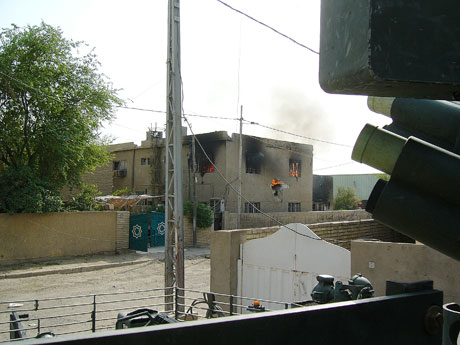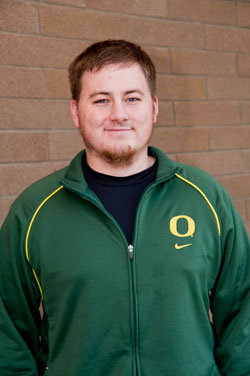
Contribued photo by Daniel Rhine
Private First Class Daniel Rhine looks at the building he was being shot at by four al-Qaida members.
Within an inch of death:
The Daniel Rhine Story
The Advocate
Bullets buzzing by your head. A single shot deciding if you live or become a statistic. Trying to shoot at the enemy while keeping composed and not hiding in terror.
|
||
For war veteran and MHCC student Daniel Rhine, every emotion flowed through his body during his time served in Iraq as a Private First Class Army man. For Rhine, it is a memory that will remain the rest of his life.
Rhine was just another student at Cleveland High School in Portland who heard that the Army could offer free tuition.
“They are paying for my school,” he said. “What’s not to like about that?”
On Nov. 5, 2007, and 18 years of age, Rhine went to an Army recruiting office and enlisted.
“I wanted to be in combat,” said Rhine. “I felt the Army was best for me. Navy you couldn’t fight and I didn’t like the Marines so I joined the Army. So I went to the recruiting office and 10 days later, I was in basic training.”
For Rhine, just joining the Army was a hard adjustment for him.
“It is a whole different life in the Army,” said Rhine. “You have so much freedom on the outside but in the Army, you are told what to do every day.
Decisions are made for you and it was hard to adjust to. Also, when you first join as a private, the military doesn’t look at you like you’re one of them. You are an outsider trying to get in with them.”
After going through basic training, Rhine was sent to Baghdad, Iraq, for his assignment as Private First Class Rhine.
“I left in August of 2008,” he said. “My first duty station was in Baghdad in the center of the city that was more developed than anything else over there.”
During his stay in Baghdad, Rhine said it was easier for him than what he would face during his next assignment in two months.
“We did lots of cleaning sweeps and crowd patrol,” he said. “We patrolled streets and it was the easiest part of our trip but also hard because we had to watch everyone and everything.” Rhine and his patrol group continued patrolling streets until he and his platoon were relocated to outer Baghdad, in the city of Al Dora, where he would encounter his first action.
“Al Dora was a broken-down city,” said Rhine. “It was completely opposite of what downtown Baghdad was like. It was nasty and we had to walk in sewer water a foot deep to get to where we needed to be.”
On Oct. 7 his time in Iraq would change from nice to hell.
“I was sitting on a rooftop and on the machine gun,” he said. “We had located an IED (improvised explosive device) and it went off and all hell broke loose with bullets everywhere.” Rhine says his life was an inch away from ending on that rooftop.
“I was behind a ledge when I was shooting at the men across in the building who set off the bomb,” said Rhine. “But when they were shooting at me, bullets were hitting the edge of the roof an inch below where my chest was exposed. I also felt the wind from bullets blowing right next to my neck from an AK-47. It was a very intense moment that I’ll never forget.”
During the attack, Rhine’s company was firing on four men in a building believed to be part of al-Qaida and were engaged in fire with the men for about half an hour until a helicopter launched a missile into the building and a fire started from the heat of bullets being shot.
“From my waist up I was exposed and I saw the guy who set of the IED,” said Rhine. “We kept shooting for like half an hour until the helicopter came in and fired the missile. We never found the guys after the building caught on fire but people said they saw four men exit the house and last I heard of them one died and one was injured.”
For Rhine, his first experience became a lesson on what to expect in case of future battles during his time in Iraq.
“It was scary,” he said. “It’s an adrenaline rush. I can’t really explain everything I felt. It just hits you immediately and is an extremely scary situation to be in.”
After realizing his life could have ended that day, Rhine left the war for a brief stint and came home from Dec. 1-20. Rhine had many issues with civilian life that just didn’t seem right.
“When I came back for 18 days, it was very weird. It was hard to come back and adjust. You are aware of everything over there. You are trained to watch people’s hands and eyes and avoid potholes when driving because anything and everything over there could and probably is a bomb.”
Rhine had a hard time driving back home after driving his platoon’s vehicle in Iraq.
“I was avoiding every pothole and watching everybody with what they did. It was good to be back but definitely a weird time.”
The biggest problem he and his family had was what to talk about. They didn’t know how or what to even ask him when he came back because they didn’t know what to expect.
“They were very cautious with me,” he said. “They didn’t know what to say because of how I was. They didn’t even want to wake me up because they didn’t know how I would act if woken up.”Upon returning to Iraq, Rhine’s unit was moved to the Diyala province for the remainder of his service. But that experience was a whole other world than what he had experienced.
“I will never forget this date,” said Rhine. “On Feb. 6, six guys got killed in a house-born IED. Four other guys were also injured in the explosion.”
“We were all friends,” he said. “It was the most dramatic thing for us. It affected everybody. We all knew each other and it was really hard to see the massive surge of them (al-Qaida) who set off the bomb get away. We never caught the guy who set it off and it sucks.”
Rhine was told by Iraqi nationals that it was an al-Qaida extremist who was high up in command and had much power over the provincial group of al-Qaida members. But more important after taking back the city from al-Qaida, Rhine noticed a presence of what al-Qaida does.
“They strike fear into people,” he said. “Local nationals wouldn’t come out and little kids wouldn’t come out and play on the streets until we had been there for probably two weeks. After those two weeks, kids started to come out and play and locals came back to the city. It was sad to see. The town was a mess. Al-Qaida blew the town up and was pretty much bulldozed when we got there.”Rhine finished his tour of duty on Oct. 20, 2008.
Instead of heading directly back to the states, Rhine and his Army friends traveled in Europe. He thought he was okay and was not going to experience any problems once he left the Army.
“I really thought I would never have a bad adjustment,” he said. “But when we were visiting Romania, at night fireworks went off and we started ducking behind buildings because we were so used to thinking it was grenades and gunfire coming at us.”
When Rhine came home, he started having bad dreams.
“One dream I had was I was driving in Sandy in a military vehicle and hit a pothole and it just went on a downward spiral from there. I’ve had dreams of explosions and firefights as well has many of my friends from my unit.”
Rhine has a deeper understanding of what the term freedom means to him and others in his life.
“You don’t really take anything for granted,” he said. “There is no freedom in Iraq. If you walk out your door, you got shot. I watched a guy get in a car wreck get out and shoot the other guy and drive away. In America you don’t leave your house wondering if your going to die every day of your life. In Iraq, that is all you’re thinking about. I can never take freedom for granted ever again.”
Rhine said he hopes to get his degree in business after moving on from MHCC. “I want to own a small business someday,” he said.
Rhine said he doesn’t regret any of his time in Iraq.
“I have seen a lot and been a part of a lot of stuff,” he said, “but I can never take any of it for granted and don’t regret ever enlisting and never will.”
The Advocate reserves the right to not publish comments based on their appropriateness.
![]()
Notice: Undefined variable: c5t_output in /hermes/walnacweb06/walnacweb06ac/b2874/moo.advocateonlinenet1/mhccadvocate/110509/DanielRhineFeature.php on line 244
![]()

